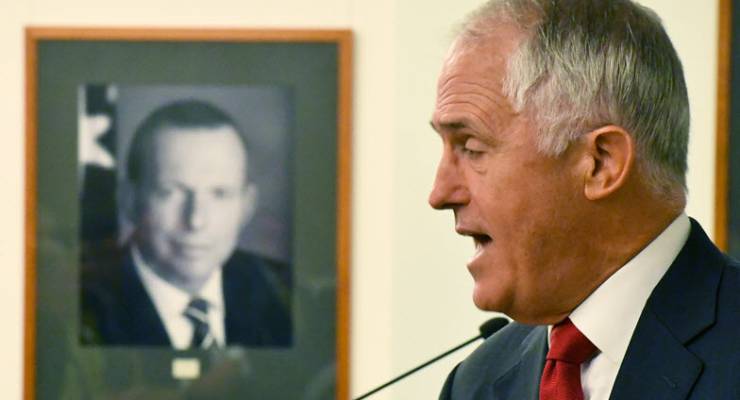
Tony Abbott and the coal fetishists of the Liberal Party are spoiling for a fight over a possible Low Emissions Target (LET). And it’s a fight Malcolm Turnbull needs to have and needs to win.
Because Abbott simply doesn’t believe in climate change but knows he must pay lip service to taking it seriously, he has contorted himself into any number of positions on climate action policies over the years. He has held every possible position, including backing a carbon tax and an emissions trading scheme. And he rejected a market-based solution in favour of a big-spending, big-government, winner-picking grants program once he became Liberal leader.
Now, he wants to go further and subsidise coal-fired power. He hasn’t said as much, but that’s the logical consequence of opposition to any policy that reduces the role of coal-fired power. Coal is dying, Australia. The current generation of old, highly polluting power stations is nearing the end of its life, and some plants are already there. Investors don’t want a bar (or lump) of coal — either keeping existing stations going with extra investment, or building new ones. Not even the fabled “clean coal” power plants of fossil fuel lobby invention, or the equally mythical workable carbon capture technology.
The only logical outcome of Abbott’s opposition to the reduction in the role of coal is, therefore, the government spending billions building new coal-fired plants to provide cheap but emissions-intensive power. Abbott is thus backing an essentially socialist position of big-spending government control of the energy market.
And that’s despite an LET being better for coal given the current state of the gas market, which means gas prices are prohibitively high for gas-fired plants.
None of that detail matters, of course, for Abbott. He doesn’t have to govern; he’s skilled at negativity but a poor policy and particularly economic thinker; from the backbench, he has the luxury of criticising policy without having to offer his own.
For Turnbull, there’s no avoiding the policy challenge. He simply doesn’t have a climate action policy to deliver what Australia has committed to delivering on emissions abatement, and the lack of a policy, and especially the lack of a bipartisan policy, will continue to wreck energy investment, even if he decided to follow Trump out of the Paris agreement. More to the point, a defeat by the Abbott forces will simply return him to the pre-budget position of being seen as a weak leader controlled by the far right of his party.
Abbott may think this will play out just as 2009 did, with himself at the head of a brave charge to defeat a Turnbull-Labor alliance on climate action. He might have forgotten that he only won back then by one vote. Or he simply might not care — whatever hurts Turnbull is good, no matter what the outcome.








Test 16
If Malcolm Turnbull wants to retain any credibility whatsoever, he must stand up to the right wing “dumbbells” of the LNP.
Geez, the sooner Abbott retires/is voted out/is deselected by the Liberials the better. Just wishfull thinking as none of these daydreams will happen in the near future.
Tony the ‘mal’ – ignant. Exists on a media stage as a counter weight to Malcom the ro – ‘bot’. Both puppets; futures linked, to jump, jerk and twirl to Media grabs whenever necessary or politically advantageous. The enmity each has for the other is palpable. Meanwhile, governance, electorate and development of policy essential to national priorities capable of addressing future threat or opportunity remain untended. Climate change will re-engineer where and how Australians might live. Worldwide demographic dislocation. Transition from Industrial Age to pretty much an instantaneous Technological Age. Energy/Waste. Inequity. Global Instability.
“None of that detail matters, of course, for Abbott.” “For Turnbull, there’s no avoiding the policy challenge.” Australia’s security focus may be somewhat unbalanced. It is Leadership that is lacking and it is overtime for media to get on side.
“Logical consequence ….”? When the subject is Tony “Wether-vain” Abbott – riding his unicorn, Coal, that only eats tax dollars?
He’s probably a wether because of damage from too much time on that narrow bicycle seat but what he has to be vain about is a mystery.